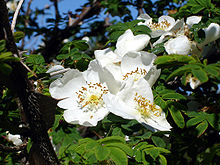Rosa sericea, the silky rose,[1] is a species of flowering plant.
| Rosa sericea | |
|---|---|

| |
| Scientific classification | |
| Kingdom: | Plantae |
| Clade: | Tracheophytes |
| Clade: | Angiosperms |
| Clade: | Eudicots |
| Clade: | Rosids |
| Order: | Rosales |
| Family: | Rosaceae |
| Genus: | Rosa |
| Species: | R. sericea
|
| Binomial name | |
| Rosa sericea | |
The closely related Rosa omeiensis is sometimes treated as a subspecies of R. sericea.
Distribution
editIt is native to south-western China (Guizhou, Sichuan, Xizang, Yunnan), Bhutan, northern India (Sikkim), Nepal and Myanmar; it grows in mountains at altitudes of 2,000–4,400 m (6,600–14,400 feet).
Description
editIt is a shrub growing 2 m (6+1⁄2 feet) tall and is often very spiny. The leaves are deciduous, 4–8 cm (1+5⁄8–3+1⁄8 inches) long, with 7–11 leaflets with a serrated margin. The flowers are 2.5–5 cm (1–2 inches) diameter, white, with (unusually for a rose) only four petals. The hips are red, 8–15 mm (5⁄16–19⁄32 inch) diameter, with persistent sepals, and often bristly.
Forms
editThere are four formae:
- Rosa sericea f. sericea
- Rosa sericea f. glandulosa T.T.Yü & T.C.Ku.
- Rosa sericea f. glabrescens Franchet.
- Rosa sericea f. pteracantha Franchet.
Cultivation and uses
editRosa sericea f. pteracantha is grown as an ornamental plant for its large, bright red thorns.
Gallery
edit-
A shrub of Rosa sericea f. pteracantha
-
Winged thorn rose detail
References
edit- ^ BSBI List 2007 (xls). Botanical Society of Britain and Ireland. Archived from the original (xls) on 2015-06-26. Retrieved 2014-10-17.